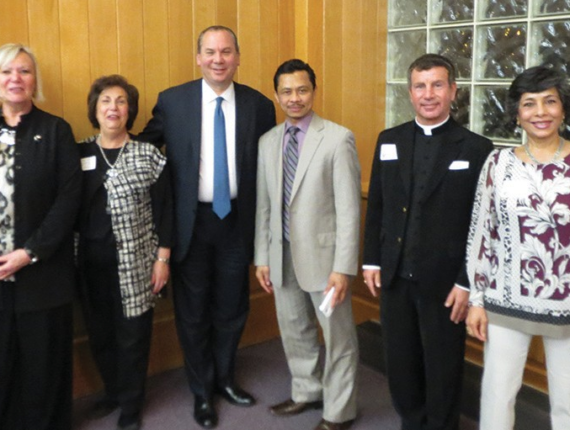
The Jewish Voice
By David Portnoe

When Imam Shamsi Ali, a Muslim cleric from Indonesia, came to the United States in 1995, he had a host of biases and misconceptions about those he described as “the other,” non-Muslims. Those views began to change when he moved to Astoria in Queens, and his family befriended an Irish Catholic.
Ali’s biases toward Jews remained, however, until he met Rabbi Marc Schneier, an Orthodox rabbi and a cofounder with Hip Hop mogul Russell Simmons of the Foundation for Ethnic Understanding. The two religious leaders met when they were on a CBS News panel following the 2005 death of Pope John Paul II. At the time Schneier and Ali met, Schneier himself harbored negative views of Muslims, basically revolving around his strong support of Israel and the threat posed to the Jewish State by Muslim Arabs.
“That meeting planted the seed,” said Schneier, of what would become an ongoing collaboration promoting peaceful coexistence between Muslims and Jews. Today, Schneier and Ali travel the world defending each other’s religion and promoting interfaith cooperation. The two have also authored a book, “Sons of Abraham.”
“I’m not saying that we are at the Promised Land, but the good news is that the journey has begun,” Schneier told those gathered last week at Temple Emanuel in Cherry Hill for an event co-sponsored by The Jewish Catholic Muslim Dialogue of Southern New Jersey and the Jewish Community Relations Council (JCRC), an agency of the Jewish Federation of Southern New Jersey. The event was held in conjunction with the Bank of America Festival of Arts, Books & Culture of the Katz JCC.
Schneier said that there are 14 billion Muslims in the world and 14 million Jews. A way needs to be found for the two groups to coexist peacefully. Among the activities the two men have promoted are summits of imams and rabbis in a number of countries. Conscious of the potential for the Middle East conflict to destroy their efforts, they have determined that the Middle East conflict would not define them, and that they had other issues to discuss.
Ali said that one of the biggest obstacles he faced in getting the Muslim community to participate was the view that Jews view themselves as “chosen.” He told of hearing this view from one of his Egyptian congregants. Ali told the congregant that in the Koran, there is a concept that Muslims are “the best.” So Ali said, “Let ‘the best’ meet ‘the chosen,’” a response that drew a laugh from the audience.
Following introductory remarks, Schneier and Ali took questions from the audience. Father Joseph Wallace, director of Interreligious and Ecumenical Affairs for the Diocese of Camden and codirector of the Catholic Jewish Muslim Dialogue, served as the evening’s facilitator.
When a questioner asked Ali about the concept of “Jihad,” often translated as “holy war.” Ali said that the word originally meant “struggle,” and was used to describe an individual’s efforts to better himself. Later, the word was used to mean “defensive wars.” Ali said that all religions have holy books that talk about war, but it is important to read those books in context. “Islam is about being open- minded,” he said.
Schneier noted that the Jewish Bible speaks of taking “an eye for an eye,” and that the way the Jews conquered the Promised Land is not “a pretty picture.” He said that no Jew today would take “an eye for an eye” in its literal meaning. “We should extend the same courtesy to Muslims,” he said.
Schneier said that what he and Ali are doing goes beyond dialogue. “We are about fighting for the other. If you want to be part of our coalition, you have to be a Jew who speaks out against Islamophobia and a Muslim who speaks out against antisemitism and Holocaust denial. When it comes to the children of Abraham, we not only share a common faith, we share a common fate.”
One questioner noted that the announced topic for the evening was, “A Candid Conversation about the Issues that Divide and Unite Jews and Muslims.” Asked about the issues that divide them, Schneier said that the “elephant in the room” is the Israeli-Palestinian conflict. He said, however, that it is possias ble to “agree to disagree without being disagreeable.” He said that the politicians can work on the political peace process, and that he and Ali would work on the “spiritual peace process.”
“We have to be optimistic that we are beginning the journey,” said Ali. He added, “You don’t see the tree without the seed.”
Following the program, Ali and Schneier signed copies of their book, “Sons of Abraham.”
Copyright © 2025 Foundation For Ethnic Understanding. All rights reserved. | Privacy Policy